I paid off my debt, now what?
Paying off all of our credit card debt 5 months ago was our biggest financial accomplishment this year, but the fear of going back into debt is still very real.
This is why there are several very important things to do after becoming debt-free that you need to do right away.
Don’t worry if you’re still in debt, most of these things should be done, but if you’re already debt-free *woot woot* you definitely can’t forget them if you want to stay out of debt.
{This post may contain affiliate links, which means that I may receive a commission if you make a purchase using these links, at no extra cost to you! Full disclosure policy.}
#1 CELEBRATE
Give yourself a giant pat on the back. You know why? Because it’s free!! Lol. Okay corny. In all seriousness, paying off your debt is a really big deal and you should be proud of yourself.
It doesn’t have to be extremely lavish. Go out to dinner, go see a show (we went to A Bronx Tale), or something you haven’t done since working on paying off your debt.
Tip: Reward yourself every now and then, but don’t revert to your old spending habits or live above your means.
#2 BUILD AN EMERGENCY FUND
As I have mentioned time and time again, building an emergency fund is THE most important thing to do during and after becoming debt-free. It’s one of the six bank accounts you should have and it is because of our emergency fund that we will NOT be going back into debt.
This month we have been struggling to come up with the money to pay our credit card bill in full without tapping into our emergency fund/savings. It has been full of expenditures for car maintenance, child care, vacation, patching our roof, replacing the roof on our shed, and registration fees for our daughter’s schooling for the school year. If we need to we can dip into our emergency fund to cover the household repairs.
Related post: Emergency fund guide: Why you need one ASAP
Since paying off our credit card debt we’ve become more aggressive with what we automatically put into savings. It’s my attempt to make up for lost time. We also contributed $11,000 into our Roth IRAs for 2017.
We never carry a credit card balance over so that we avoid having to pay interest.
Okay I lied. Last month I accidentally carried a balance on our credit card because I made a miscalculation and the holiday weekend. Currently seeing if the credit card will waive the $41.78 interest fee. Ask and you shall receive! Because we always pay our credit card bill in full and on time I asked if they could waive the interest as a courtesy and they did.
While paying off your debt sock away a little bit of cash here and there for those rainy days. My money saving coloring page challenge is a fun way to save $300 at a time.
Once you are debt-free make your emergency fund even bigger until you have enough to cover 3 to 6 months worth of expenses. When you dip into your emergency fund make it a priority to replenish your funds to avoid going back into debt.
Tip: Now that your debt is paid off build your emergency fund to a size you are most comfortable with. I want ours to be a minimum of $10,000.
Related posts:
* Interview with a millionaire
* DIY Glitter Money Jar Tutorial
#3 AVOID TEMPTATION
As a friendly reminder avoid temptation. Just because your debt has been paid off it doesn’t mean you can go on a spending rampage.
Ask yourself these questions when you’re thinking about making a purchase:
1. Do I need this or do I want this?
2. Can I get a deal through Groupon or a discount using eBates?
3. Is my emergency fund built up first?
Tip: Buy only what you need. If you want something save for it. Only if you can pay for it in full should you buy it.
#4 KEEP BUDGETING
My husband hates hated budgeting. It can feel restricting but it’s what rich people do because it works. This is why budgeting is something you need to do while getting out of debt, but especially afterwards.
While in debt we didn’t budget, but we had a spreadsheet with our expenses and income. Even without a “true” budget we were able to get out of debt, but I’ll admit, if we had one it would have been a lot easier and gone a lot faster.
Now we have a spreadsheet that we try to go over every week or two. Our expenses are much more accurate because we did an average of what we spent the whole year.
Our budget allows us to see how much money we can save each month and after budgeting we have come to the harsh realization that we don’t have much wiggle room.
Tip: Even if you hate budgeting suck it up and do it. It doesn’t have to be super strict, but give yourself some boundaries so you are always saving some money and not heading back into debt.
#5 SIDE HUSTLE
Having more than one stream of income is the best way to get out of debt and save faster.
My husband and I worked overtime when we could so that we could put more towards our debt each month. We were selling things on the side and I started blogging as a passive income. However, it wasn’t until recently that I started making money blogging.
List of side hustles to make money fast
After we paid off all of our credit card debt we didn’t hustle as hard or work any overtime. We are now starting to feel the effect of that. We have been paying all of our bills in full, but things have felt a little tight. I really want to start investing more heavily and paying more towards the principal on our mortgages. This means we need to start bringing in more money to do that.
Tip: Figure out what side hustles work for you. Babysitting, lawn care, crafts, blogging, and more are all ways you can bring in extra money.
#6 INVEST
After you become debt-free it’s important to invest your money if you haven’t started doing so. Investing your money will help you save more for retirement, vacations, college, and more.
Money in a simple savings account will lose value due to inflation. I have some of our money stored in an online high-yield savings account because the interest rate offered is one of the highest on the market and increases automatically.
Use your resources. My friend at work that used to work on Wall Street and a few other financial aficionados that give me great advice.
I get Kiplinger and Money magazine sent to my house. I like them because they are easy to understand and give great financial advice in every issue. My husband bought me several financial books and my favorite thus far is The Little Book of Common Sense Investing. It’s great for the new investor and explains things in terms that are easily understood.
Tip: Make your money work for you.
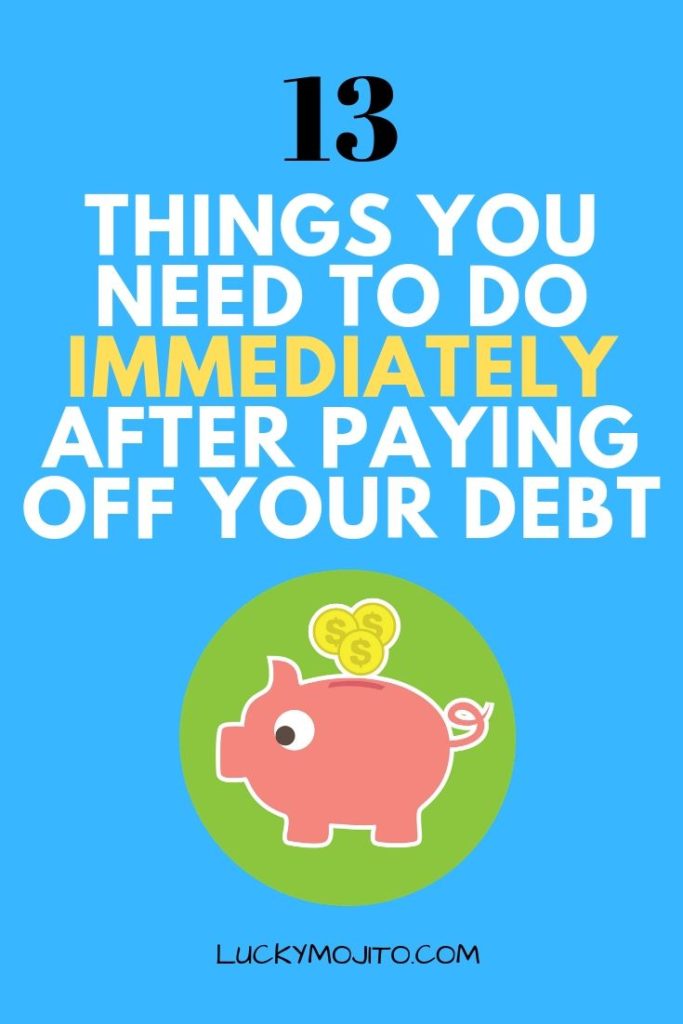
#7 PUT SAVINGS INTO HIGH GEAR
More money more problems.
Even though we’ve paid off our car loan and credit card debt there are still expenses that come up. We just had to replace the brakes on our truck and patch our roof.
Some months we save a lot more than others. I don’t let it stress me (too much), but at the same time really push to increase the percent we save each month. Automating what goes into our savings account has been the easiest way to do this.
Tip: It’s important to increase your savings significantly once your debt is paid off. E.g. If you had a car payment that was $400 a month that you no longer have that is a minimum of $400 you can save/invest.
#8 PERFORM HOME & CAR REPAIRS/ MAINTENANCE
After you get out of debt it’s important to do a full rundown of your cars’ and home status. See what needs to be fixed or updated and when.
I often see people let their homes get run down and only make repairs when absolutely necessary (see: my parents). The problem with that is you have no time to shop around and tend to pay higher than average prices. Things start to break all around the same time too.
We just repaired our roof because we had to. Luckily we priced around and feel like we got a good deal.
After getting out of debt it’s important to save for big repairs and maintenance. You know you’ll eventually need new car tires, brakes, new hot water heater, etc. Do yourself a big favor and save for these types of situations so you don’t have to struggle to come up with the cash.
Tip: Maintain your car and home so they don’t crap out on you all at once.
#9 SINKING FUND AKA F*CK IT FUND (pardon the language)
I was reading a fashion magazine and was delighted to find an article focused around women and finances.
They mentioned something called a f*uck it fund. This fund is for anything and everything except emergencies. After you pay off your debt and only after you build your emergency fund should you contribute to this fund. It can be used for vacations, getting your nails done, eating out, doing new activities.
Having a f*ck it fund means never having to depend on anyone else. I have my own account for when I want to buy gifts or splurge on something for myself or my family.
Tip: If you travel a lot, go out to eat, and spend a lot on entertainment consider making yourself a f*ck it fund.
#10 DONATING/SHARING THE WEALTH
Even while we were paying off our debt we donated items and money to causes close to our hearts. There’s always someone in more need than you. If you really can’t afford to donate anything consider donating your time.
Tip: The more money you have the more you can donate and give to others.
#11 CREATE A WILL
After paying off your debt it’s very important to create a will if you haven’t already done so.
You’ve worked hard to pay off your debt, save money, and buy your things. I know this is sort of a downer, but it should documented what you would like done with your treasures in the case something happens to you.
Lots of people don’t do this (we have designated beneficiaries on all of our major money accounts) and it only causes headache to the loved ones in your life. Get it done. I plan to have ours done before the end of this year.
Tip: Document what you want done with your belongings and who you want them to go to and save a lot of people a headache.
#12 SET FINANCIAL GOALS
Now that you’ve paid off your debt what is your next financial goal? Retire early, save for your kids’ education, pay off your home, buy another piece of investment property?
Keep evaluating your investments, savings, and budget. Here are some tips to successfully achieve your goals.
Rich people can tell you how much they will have saved in 10 even 30 years from now. I could only tell you what I’ll have by the end of this year. Rich people plan for the future and are very goal oriented. I plan to re-evaluate our finances for the umpteenth time in another two months. We currently have a lot of money movement going on so it just makes sense for us to look at the short-term for now.
Tip: Keep setting new goals for yourself. Constantly talk about them with people who can help motivate you and give you ideas to reach them faster.
Related posts:
* 6 Bank accounts you should have
* 11 Things rich people do that poor people don’t
* How I finally started making money blogging
#13 FOCUS ON RETIREMENT
Retirement may be very close for you or very very far. In either case it is something you need to think about, especially after becoming debt-free.
We contribute to our deferred compensation plan each week and now have a Roth IRA that will be used for either retirement or our kids’ college education, we haven’t decided just yet.
Before paying off our credit card debt I joked to my husband that I wanted to retire early. Now that our debt is paid we can focus on our mortgages and looking at our finances retiring early could be a reality. Maybe not 20 years early, but I’d be happy with 5 😉
Vicki Robins is a 72 year old woman who’s the author of Your Money or Your Life, a book that has been inspiring people, especially millennials to work towards early retirement.
Tip: Don’t think anything is impossible. There’s a huge community of people who are focused on FIRE, Financial Independence, Retire Early.
FINAL THOUGHTS
Even if you aren’t debt-free yet these are all things that you can start doing now to set up your financial future.
Becoming debt-free should give you some sense of relief, but don’t forget these important things to do after you’re debt free. Use the momentum to create more financial goals, continue to hustle, and build up your savings.
If you found this post helpful, please don’t forget to pin for later. Thanks!
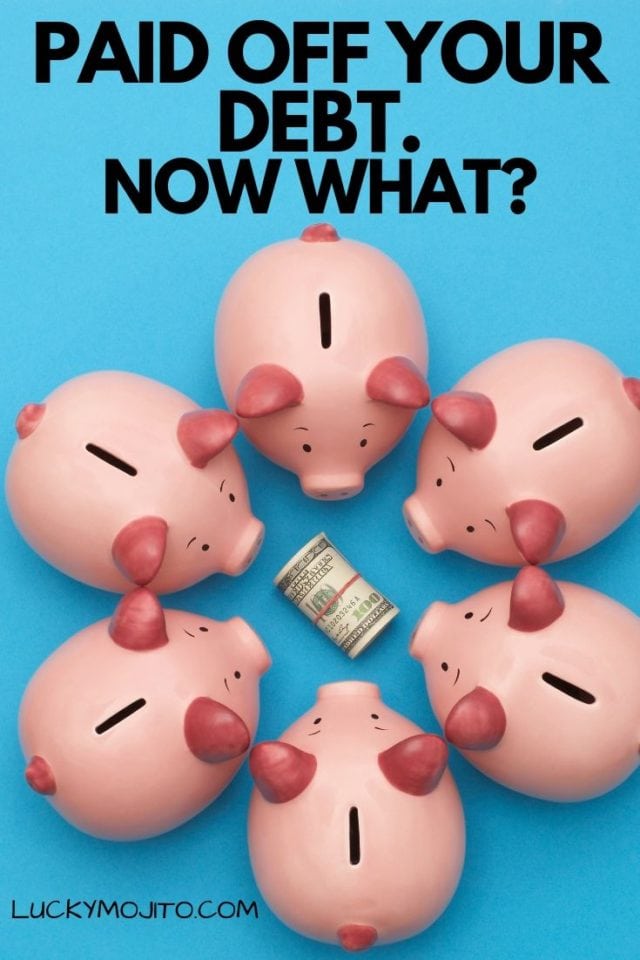
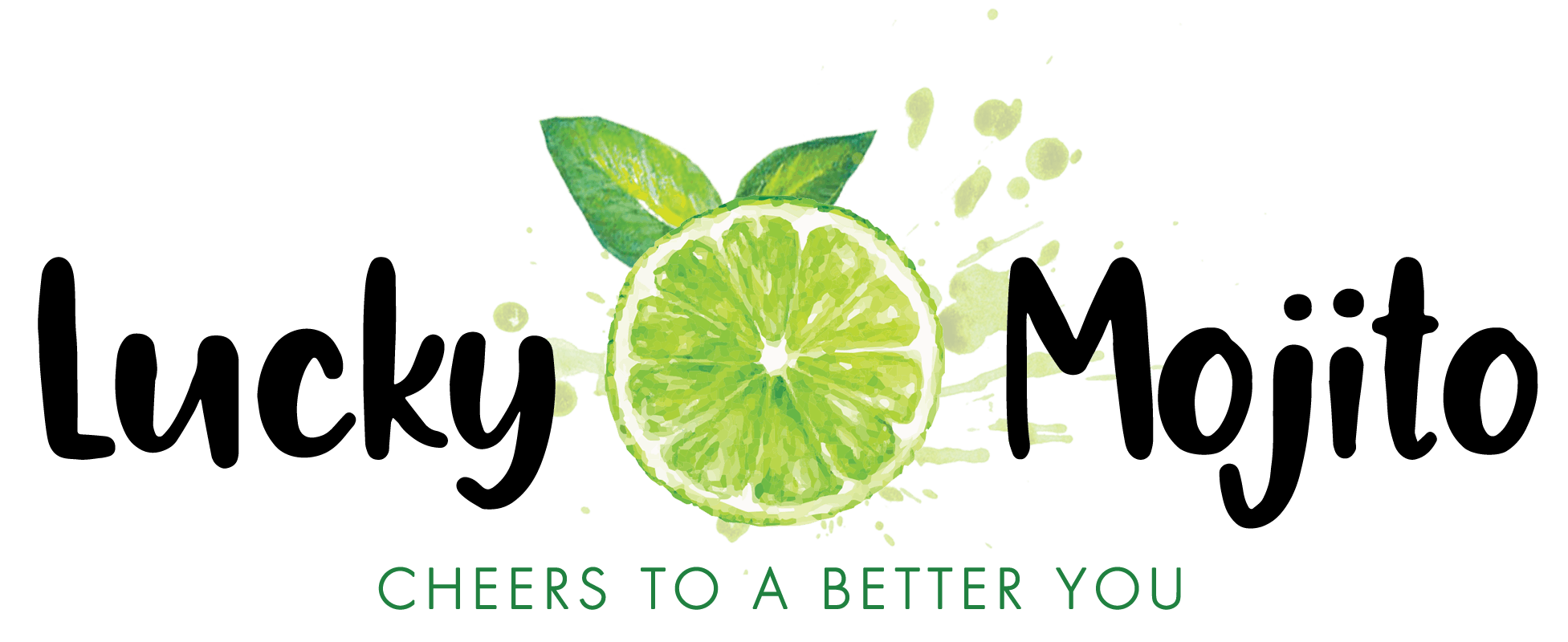
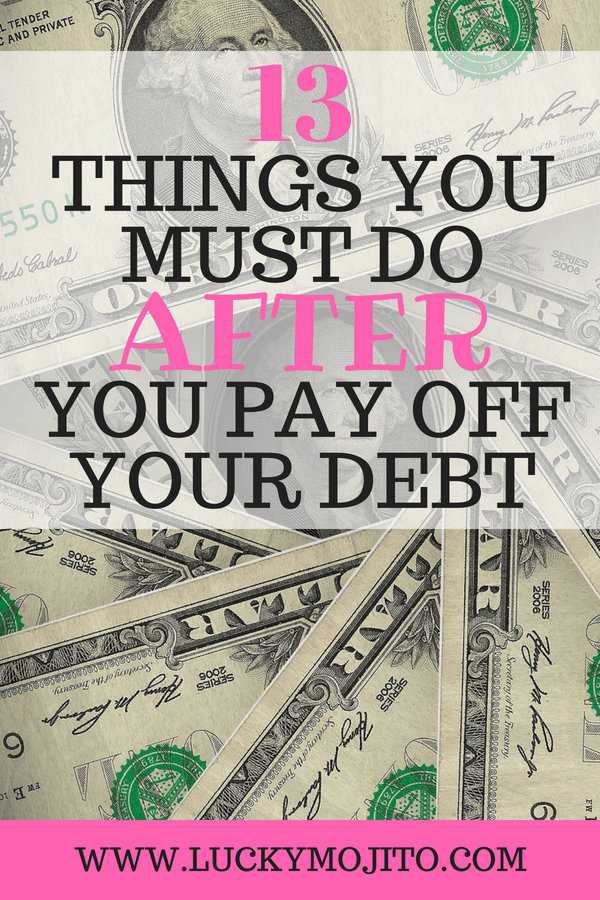

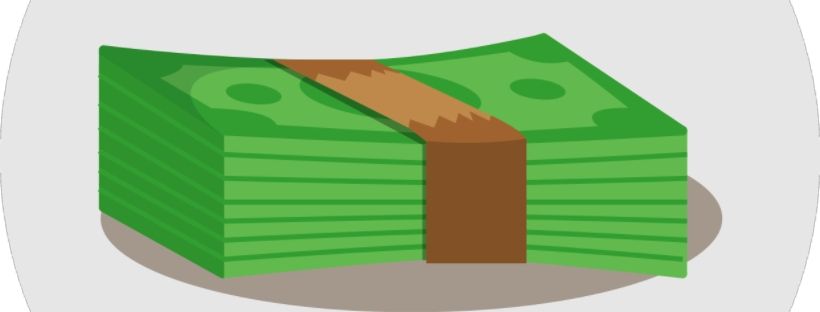
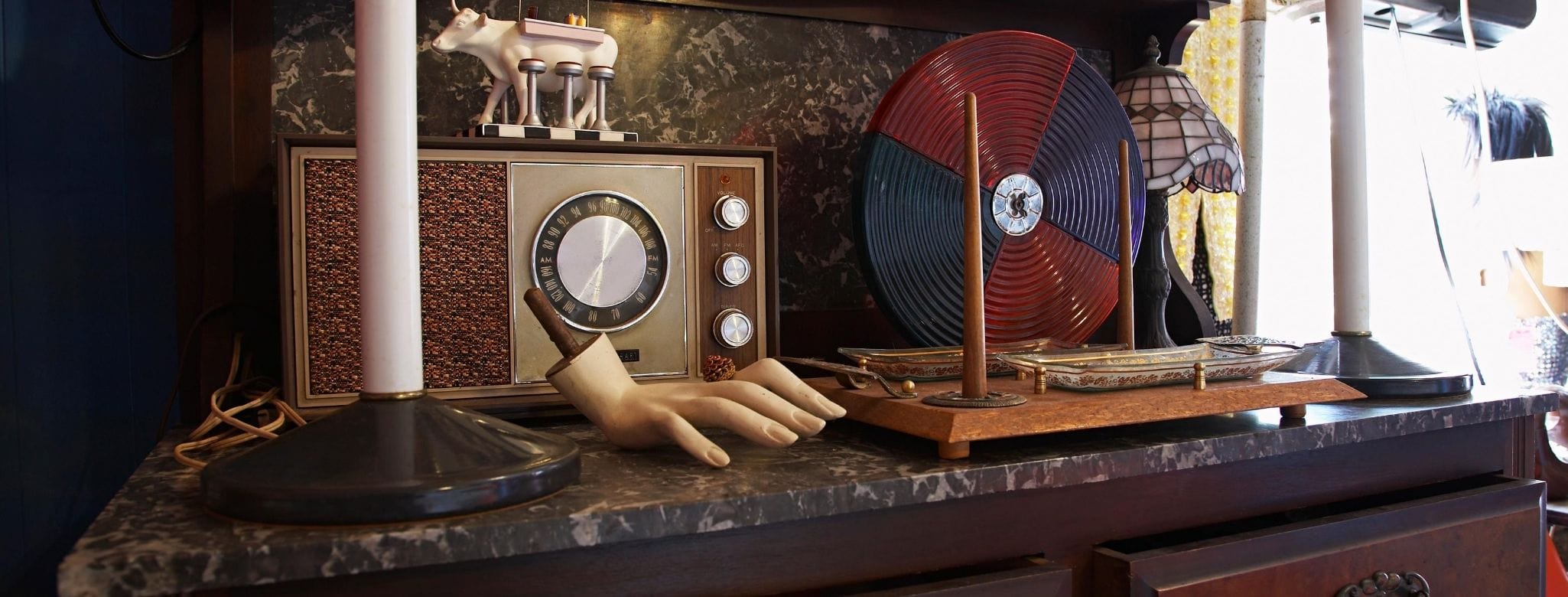
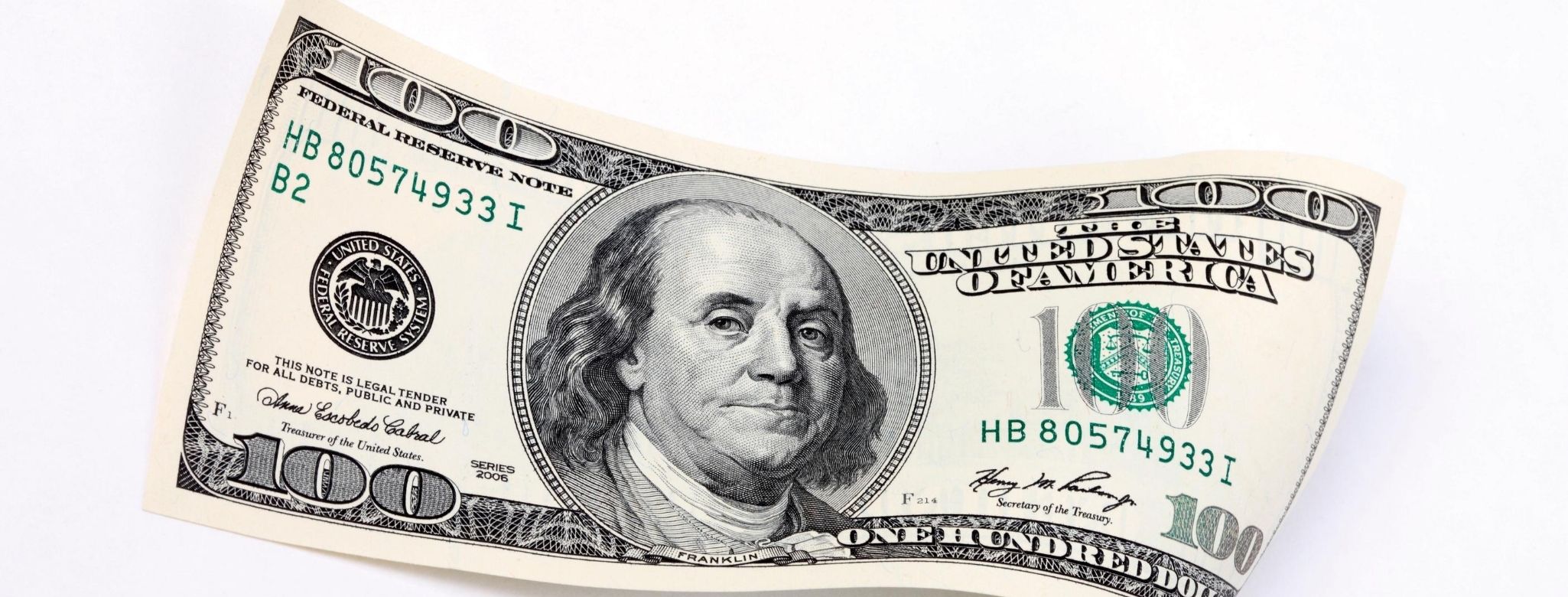
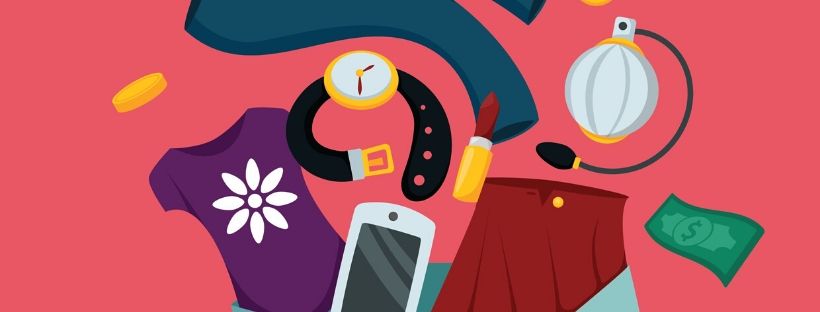
My husband is a financial advisor so we live in the investing world and I love this post and your blog! I think it has great advice! 🙂
You just made my day 🙂 I’m no financial advisor, just love giving tips I’ve found useful myself. thank you!!
I love this! We are currently almost done paying off our credit card debt. Now I know what to do next. Thanks for sharing 😊
I’m so happy for you! It’s such a good feeling. I’m still working on that emergency fund lol